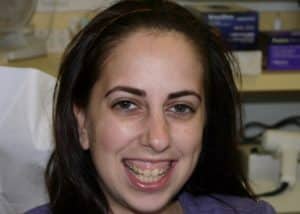
Who Is A Candidate For Full Mouth Restoration At Our Office In Rydal, PA?
This treatment may be performed on patients who have missing or severely damaged teeth caused by:
- Decay
- Injury or fracture
- Acid erosion
- Tooth grinding
- Malocclusion
Missing teeth often leads to serious dental problems and can significantly inhibit a patient’s ability to eat and speak. It is important to seek restorative treatment for any missing teeth, but especially when most or all of the teeth are damaged.
Full Mouth Restoration Results From McDowell Dental Group’s Patients


What Full Mouth Restoration Options Are Available?
There are many different treatment options available for patients requiring reconstruction. Each type of dental restoration offers its own benefits and several treatments may be combined to complete a full mouth restoration.
There are a wide variety of prosthetic materials that are commonly used to replace damaged or missing teeth. These materials may be permanently implanted or bonded in the mouth or can be removable and temporary. They may replace individual teeth, a few teeth or all of the teeth. Some of these options may include:
Frequently Asked Questions About Full Mouth Restoration
The purpose of full mouth restoration is to give a person back the highest degree of chewing function and a lovely smile to go along with that. What it takes to achieve this goal is different in every situation. Some people may need only the upper arch of teeth replaced and treated for gum disease. Some may have multiple teeth on each arch, upper and lower, that need some degree of repair. During our consultation, we can determine the problems that are present and develop the most appropriate plan to treat each, and in what order. In some cases, the full mouth restoration process may take a month or two. In others, it may take a year or longer. This is because each part of the process is scheduled independently, with some time left in between for full recovery.
No. Every step of the way, we perform treatments with a priority placed on patient comfort. Every procedure visit begins with an application of a topical numbing gel in the area where anesthetic injections are given. This desensitizes the gums so injections are barely felt. Some patients have no problem receiving their injections of local anesthetic without this extra step. Once the anesthetic has been administered, the area around the tooth or teeth is numb for the duration of the procedure. After various restorative dental treatments, patients may experience temporary swelling and soreness or tenderness. To manage these temporary side effects, they may take an over-the-counter pain reliever like acetaminophen. Medication should be taken as directed and may be augmented by placing a cold compress on the outside of the cheek on the side of the mouth that feels sore.
Soreness and tenderness after dental treatment are not uncommon. Depending on the treatment that was performed, the dentist may recommend eating a liquid diet for a few days or a soft-food diet. Gradually adding denser foods or crunchier foods like toast allows inflammation in the gums around the tooth or teeth that were treated to dissipate.
Any number of treatments may be involved in full mouth reconstruction. Every case is built around the needs of the patient and their desired outcome. Some may involve root canal therapy and crowns and some may involve tooth extractions and a bridge, denture, or dental implants. During our consultation, patients discover the problems that are affecting their smiles and quality of life. They are informed about the treatments that can address and correct these problems, and the reason each is a valuable aspect of the larger treatment plan. Each part of the treatment plan is performed as a single procedure or a small combination of procedures that hold relevance to one another. For example, root canal therapy and dental fillings may be combined during the same treatment in some cases. One thing patients can count on is that they will understand their treatment plan and which procedures their dentist wants to include in that after their initial consultation.
During a treatment plan for full mouth restoration, there may be multiple recovery periods. Fortunately, most of them are very short. At the beginning of each appointment that progresses the treatment process, the dentist or assistant can review what is being performed that day and how to manage mild to moderate side effects after the appointment. In most situations, recovery involves taking a day or two off to rest and avoid strenuous activity. Patients may take medication for up to one week, depending on their comfort level. It may also be helpful to eat softer foods for up to several days as the nerves and soft tissues settle after a procedure. At no point during recovery periods should patients experience significant pain. We do all that we can to make the entire process as comfortable and stress-free as possible.
Keeping in mind that full mouth restoration occurs in phases, patients may have very little of their daily life affected as we rebuild a healthier and more attractive smile. Usually, comfort is maintained nicely with medication and the consumption of softer foods. Examples include smoothies, oatmeal, grits, eggs, soft noodles, soup, and yogurt. It is advantageous to start soft or liquid and gradually add in foods that require more chewing. As chewing resumes, it is necessary to move slowly and mindfully to avoid accidentally biting the cheek or lip.
Crowns
Dental crowns are individual prosthetic teeth used to replace missing or severely damaged teeth. Crowns provide a strong, sturdy, aesthetically pleasing replacement that can withstand the same pressures as a regular tooth, letting patients enjoy the convenience of eating, speaking and smiling without any problems.
Bridges
Dental bridges replace missing teeth with a short row of prosthetics that rely on the strength of surrounding teeth and help stabilize the bite. Bridges also help keep surrounding teeth from moving into the open space of the missing tooth. The surrounding teeth are prepared for the bridge, which is then attached to the teeth. Bridges bonded or cemented (not removable) to the teeth and provide a restored function and appearance.
Veneers
Veneers are shells made from composite or porcelain that fit over the natural teeth to provide a white, even, full smile and can cover up crooked, chipped or discolored teeth. They are bonded to the front of the tooth after the tooth has been buffed in preparation of the veneer, which is then bonded to the teeth with an etching solution and special light. Veneers are a cosmetic enhancement and cannot replace missing teeth.
Dentures
Dentures are for people who have lost many or all of their teeth and are usually used to replace an entire arch of teeth. Dentures can be removable or fixed, and partial or full, depending on each patient’s needs and preferences. Dentures can be treated just like natural teeth but require special care and adjustment when they are removable.
Implants
Dental implants are small titanium screws that are drilled into the jaw bone to replace missing teeth. The implant serves as the root of a replacement tooth and can be covered by a crown, bridge or dentures to provide a natural-looking replacement for the missing tooth. The implant is first placed into the jaw and then allowed to fuse with the bone before the prosthetic is placed on top. Implants provide long-lasting support that most closely replaces the individual strength and stability of the natural teeth.
Full mouth restoration is a complicated procedure that involves multiple office visits and can take up to a year or longer to complete, depending on each patient’s individual case. A customized treatment plan for each individual patient will be developed with the dentist, to help regain a healthy smile.
Schedule A Consultation
McDowell Dental Group offers full mouth restoration with dental implants, veneers, dentures, dental bridges and dental crowns in Rydal, Jenkintown, Horsham, Willow Grove, and Philadelphia, PA. For more information call 215.885.0555 or fill out our contact form today!

